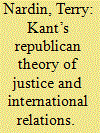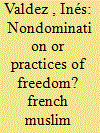| Srl | Item |
| 1 |
ID:
155792


|
|
|
|
|
| Summary/Abstract |
Kant’s primary concern in writing on international relations is how to achieve ‘justice’ (Recht) between states. This means that instead of reading Kant as a theorist of peace or world government, as IR theorists have usually done, he is better read as a theorist international justice. His view of justice, which identifies it with a legal order that respects freedom as independence or nondomination, is broadly republican. But he equivocates on the possibility of justice at the international level, and this narrows what is usually seen as a wide gap between Kant’s thought and political realism. The paradox his uncertainty reveals is that it is wrong for states to remain in a lawless condition yet impossible for them to escape it so long as they remain independent. An international order cannot generate genuine law because there are no institutions to make, interpret, or enforce it. This means that states are entitled to determine their own foreign affairs. The gap between sovereignty and justice cannot be closed so long as these ideas are defined as they are within the state. The problem is not that a full, secure, and nonvoluntary system of justice that preserves the sovereignty of states is contingently unlikely. It is conceptually impossible. This conclusion poses a challenge to current theories of global justice.
|
|
|
|
|
|
|
|
|
|
|
|
|
|
|
|
| 2 |
ID:
090134


|
|
|
|
|
| Publication |
2009.
|
| Summary/Abstract |
For Kant and many modern cosmopolitans, establishing the rule of law provides the chief mechanism for achieving a just global order. Yet, as Hart and Rawls have argued, the rule of law, as it is commonly understood, is quite consistent with "great iniquities." This criticism does not apply to a sufficiently robust, republican conception of the rule of law, which attributes a basic legal status to all persons. Accordingly, the pervasiveness of dominated persons without legal status is a a fundamental violation of the rule of law. This legal status can be understood in Kant's sense as an original "right to freedom," one that is not derived from or acquired by membership in a community or from citizenship. The realization of this kind of legal status can already be found in the "cosmopolitan constitutions" of many democracies, which include rights of persons (and not just citizens) to habeas corpus and other statuses that protect those vulnerable to domination. In order that all persons have the appropriate institutional space within which to exercise the powers of persons to address and make claims, institutions such as human rights courts to which those who lack legal status can appeal and be recognized are necessary for a form of the rule of law that is adequate to current circumstances.
|
|
|
|
|
|
|
|
|
|
|
|
|
|
|
|
| 3 |
ID:
145082


|
|
|
|
|
| Summary/Abstract |
This article proposes a conception of freedom understood as practices. Based on Michel Foucault's work on the ethics of the self, I develop a conception of freedom that exceeds liberation and distinguishes between genuine practices of freedom and practices of the self that are unreflective responses to systems of government. I develop and illustrate this conception through an engagement with the recent French ban on full veils in public spaces and the ethnographic literature on European Muslim revival movements. I reconstruct how Muslim women relate to alternative discourses through specific practices of the self. These practices reveal that French Muslim women actively contest discourses of secularism and liberation that construct them as inherently passive and in need of tutelage. The conception I develop sheds light on some shortcomings of Philip Pettit's notion of freedom as nondomination. I argue that the proposed account is useful to, first, criticize the centrality of the opposition between arbitrary and nonarbitrary power in the definition of freedom. Second, I show that the predominant engagement with the external dimension of freedom in Pettit makes it difficult to capture the particular subjective practices that make up freedom and its development in the presence of power and/or attempts at domination.
|
|
|
|
|
|
|
|
|
|
|
|
|
|
|
|